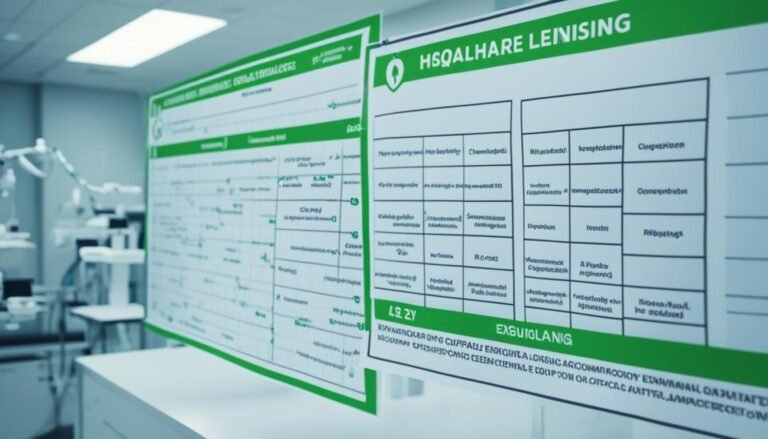Transparency Reporting in Irish Healthcare: Compliance for Pharma and Medical Device Companies
The Irish healthcare industry leads with a top-notch transparency reporting system. Thanks to companies like AstraZeneca Pharmaceuticals (Ireland) DAC, based in Dublin, healthcare data disclosure in Ireland has greatly improved. This has made the industry more accountable and trustworthy.
There are now strict rules for reporting Transfers of Value (ToVs) to those in healthcare. This includes healthcare professionals, organizations, and patient groups. These rules ensure that Irish healthcare data reporting is done carefully and in detail.
Various kinds of ToVs, like donations, grants, and even travel, are part of what gets reported. This keeps compliance in pharma and the medical device sectors on track. Companies like Novartis follow detailed transparency rules without needing direct consent from healthcare professionals. This approach is part of a larger effort in Europe, supported by EFPIA and IPHA, to promote sharing data responsibly.
Key Takeaways
- The Irish healthcare industry has a highly detailed transparency reporting system.
- AstraZeneca Pharmaceuticals (Ireland) DAC and companies like Novartis lead with stringent compliance measures.
- Comprehensive reporting covers various Transfer of Value (ToVs) categories.
- Regulations ensure meticulous compliance in pharma and medical device sectors.
- Novartis and others publish data based on a legitimate interest without requiring HCP consent.
- The policies contribute to accountability and trust in healthcare data disclosure in Ireland.
- European-wide initiatives like those from EFPIA and IPHA drive transparency in Irish healthcare data reporting.
Introduction to Transparency Reporting in Irish skHealthcare
Transparency Reporting in Irish Healthcare is crucial for ethical practices and following regulations. It details the operations of the industry and its interactions with healthcare professionals. This approach builds trust and accountability in the healthcare sector.
Healthcare transparency plays a big role in the healthcare field. In 2008, the World Health Organization stated how important primary care is. Studies show that involving the community in health programs is also key.
Health Canada’s Policy Toolkit talks about the need for patients to be part of decision-making. It helps address health disparities among vulnerable groups. These inequalities in healthcare, especially for marginalized people, are crucial. They help influence policies for better access.
Reports look into the health of homeless people in Ireland. They also study the medical services they use. Research on undocumented migrants in Europe shows the challenges they face in healthcare.
There’s detailed information on the health and healthcare of sex workers. This shows the need for better oversight. Information on immigrants’ healthcare use outlines ongoing issues, including findings on refugee asylum seekers.
These reports point out the various challenges and goals of transparency in Irish healthcare. It aims for fair healthcare access. For this, strict compliance by drug and medical equipment companies is very important.
“Transparency and accountability are key in healthcare compliance. When companies follow detailed reporting, they fight health discrepancies and build community trust.”
The progress in healthcare transparency is due to team efforts and careful oversight. It merges a variety of viewpoints to meet the healthcare needs of everyone. This collaborative approach is essential for real progress in such a crucial field.
| Focus Area | Key Insights |
|---|---|
| Primary Care | World Health Organization emphasized its importance in 2008 |
| Community Participation | Indicators developed for assessing community involvement in health programs |
| Patient Involvement | Health Canada Policy Toolkit supported public decision-making inclusion |
| Health Inequalities | Research on vulnerable groups highlights disparities in access |
| Marginalized Perspectives | Annotated bibliographies aid in policy agenda inclusion |
| Homelessness | Reports detail health status and service utilization |
| Undocumented Migrants | Studies focus on healthcare challenges in Europe |
| Sex Workers | Social exclusion and healthcare access issues reviewed |
| Well-being of Immigrants | Data collected on healthcare utilization and access problems |
| Healthcare for Refugees | Barriers to healthcare access among asylum seekers analyzed |
Healthcare Transparency Laws in Ireland
Healthcare transparency laws in Ireland ensure both public and private sectors work well. Part of a strategy influenced by the EU, they are now national laws. This makes healthcare delivery clear and reliable for patients and workers.
Overview of Healthcare Transparency Regulations
Irish laws focus on funding and how healthcare is given. The state funds the public healthcare system. Private healthcare comes from private sources, like insurance. Before 2019, public hospitals got money through block grants. Now, they use a system that helps fund patients better for their care.
Primary healthcare happens outside hospitals. Secondary services are inside them. In Ireland, if you’re a public patient, healthcare is free if you have the state medical card. If you’re private, you pay for some services. There are also schemes that help cover certain healthcare costs.
Pharmacy costs for patients are paid by the state based on set rules. The Medical Council and laws focus on patient privacy. They include the GDPR and national laws to protect patient data.
Impact on Pharma and Medical Device Companies
Healthcare transparency laws greatly affect companies making drugs and devices. The rules, like the MDR and IVDR, demand strict adherence. Companies must follow Ireland’s laws, as detailed in S.I.s 547/2017 and 261/2021, and others.
Companies need strong systems to meet these rules. They strive for safe and effective products for the EU and Ireland. The new laws push them to be more open about their work. This helps with following regulations and keeps patients safe.
The Role of Irish Medtech and HealthTech Ireland
The Irish Medtech Association and HealthTech Ireland play a key role in the growth of the medical technology field. They have over 250 members throughout Ireland. The association is run by CEOs and Chief Representatives, working for the success of big and small companies.
Their goal is to create an environment that helps companies grow and create more jobs. Minister O’Donovan is working to secure jobs in the future in this sector. Deciphex, an innovative company, won the Medtech Company of the Year award for its AI diagnostic tools. The Irish Medtech Association’s push for new technology could save many lives each year.
The Irish Medtech Association provides training programs to keep the workforce skilled. These include apprenticeships and initiatives for those in the MedTech and engineering fields. HealthTech Ireland supports this with policies to keep companies innovative and compliant.
The Irish Medtech Association and HealthTech Ireland have over 390 members combined. They are key in boosting Ireland’s medical technology sector. Leadership from Eoghan Ó Faoláin, and strong support, help keep Ireland a top leader in this field.
| Statistic | Details |
|---|---|
| Membership | Over 250 members |
| Leadership | Board of CEOs and Chief Representatives |
| Award | Deciphex – Medtech Company of the Year |
| AI Impact | Potentially save 400,000 lives annually |
Compliance Requirements for Pharma and Medical Device Companies
Pharmaceutical and medical device companies must follow health regulations closely. They need to put in place strong measures for compliance. These measures should match both EU rules and the laws of each country.
Essential Compliance Measures
Understanding and keeping up with new rules is key in healthcare compliance. This includes the recent Medical Devices and In Vitro Diagnostics Regulations. It’s very important that all medical tools are very safe.
- Regulatory Oversight: Monitoring by the Health Products Regulatory Authority (HPRA) and implementing rigorous internal auditing processes.
- Pre-Market Controls: Comprehensive pre-market assessments, including Unique Device Identifiers (UDI) to enhance traceability.
- Market Surveillance: Adherence to proactive market surveillance provisions.
- Training Programs: Regular staff training on regulatory updates and compliance strategies.
- Stakeholder Engagement: Continuous engagement with stakeholders to ensure alignment on compliance requirements.
Reporting and Disclosure Obligations
Telling the truth in healthcare reports is a must. These companies have to show any money they give to health workers. They do this to follow the law.
According to the European Pharma Code, companies must share any money they gave healthcare workers. This could be for advice, speaking, or other services. They do this every year by June, so the public knows.
| Regulatory Body | Potential Penalties for Non-Compliance | Additional Measures |
|---|---|---|
| Health Products Regulatory Authority (HPRA) | Fines up to €120,000 and/or imprisonment up to 10 years. | Corrective statements, withdrawal of offending material. |
| Minister for Health | Fines up to €300,000 for subsequent convictions with potential personal liability. | Publication of decisions, regulatory referrals. |
| Pharmaceutical Society of Ireland (PSI) and Health Service Executive (HSE) | Prosecution initiations. | Suspension or expulsion from industry associations. |
Openness and acting right builds trust with the public. Following strict medtech rules ensures the healthcare sector is responsible and trustworthy.
Conclusion
It’s vital for drug and device companies in Ireland to follow clear rules. The goal is to improve healthcare and trust. Ireland works hard to make health info open and honest through programs like Sláintecare.
Even if Ireland trails in some health data areas, it still aims to be open. The mix of local and EU laws offers a solid guide for businesses. With more than €20 billion spent on health each year, it’s crucial that companies follow strict rules. Countries like France, Belgium, and Denmark set a good example with their laws.
Groups like the Irish Medtech Association and HealthTech Ireland help their members succeed. They make sure medical device standards are high. This is good for sharing health info safely. It means everyone in healthcare wins, and the system keeps getting better.
Source Links
- Microsoft Word – IRELAND_ AZ EFPIA Methodological Note 2022_English_Final_28April2023
- Ethics, Risk and Compliance
- Are you meeting the new transparency requirements? – Gardner Law
- Exploring levers and barriers to accessing primary care for marginalised groups and identifying their priorities for primary care provision: a participatory learning and action research study
- Confidentiality and disclosure in the Republic of Ireland
- Codes of Practice – IPHA
- No title found
- Pharmaceutical Advertising Laws and Regulations Report 2023-2024 Ireland
- Medical Devices Regulation (EU) 2017/745 and In Vitro Diagnostics Medical Devices Regulation (EU) 2017/746 – HSE.ie
- Planning in the Irish Healthcare System; Legislative Strategy or Administrative Control?








